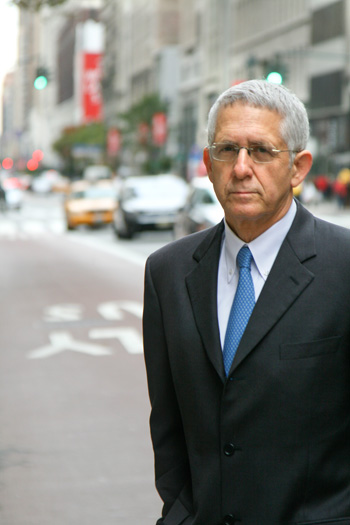ENDNOTE

Samuel Bacharach See larger image
Academic entrepreneurship in New York City
When I joined the Cornell faculty in 1974, among my thoughts was how I could find reasons to spend time in New York City. You might say that I had a personal agenda in building connections between the Ithaca campus and New York City. Happily, in the years that followed, Cornell's agenda and mine came together.
Having grown up in Brooklyn and Queens, being "centrally isolated" was not initially attractive to me, and I recall many conversations with Professor Maurice Neufeld, a founder of the ILR School and an astute observer of New York politics -- as well as a lover of the city's restaurants, theaters and museums -- who encouraged me to get to New York as often as possible. For him, New York City was an integral part of ILR's founding mission and aspirations. I am told that when the state legislature set up the ILR School in search of post-WWII industrial peace, it chose Cornell because it was removed from the labor-management battlefield of New York City. However, because it was home to many of our key constituents and a major labor-management laboratory, the city inevitably became a second home for ILR. Early on, the school created a vibrant extension division, which today offers hundreds of programs in Manhattan. What is less well known are the entrepreneurial activities of our resident faculty in New York City.
In 1993, I was awarded a National Institutes of Health grant and had to move to New York for a year to collect data. Shortly after, I was asked to look into the prospects for developing a new graduate program in New York.
It soon became obvious that in the New York metropolitan area there were adult learners in the fields of human resources, collective bargaining, labor law and labor relations who were hungry for an academic program that would allow them to delve into the social science underlying their occupations. We developed a part-time Master of Professional Studies program and launched it in 2000.
As the program approaches its 10th year, it is gratifying to see what we have accomplished. Senior faculty come to New York City on weekends to teach. Students come from varied backgrounds and have rich work experiences: Some are practicing labor lawyers, others are HR professionals, and still others come from a union background. But all share a common interest in the social dynamics of the workplace. I believe our greatest success has been to welcome such a highly motivated, enthusiastic and accomplished group of professionals into the Cornell graduate school community. For me, these nontraditional students serve as a reminder that Cornell's positive influence reaches far beyond campus boundaries.
ILR's resident faculty has become engaged with New York City in other ways. One long-standing program is the Institute for Workplace Studies' colloquium series, held several times a year at the Cornell Club. These dinner seminars bring together academics, practitioners, policymakers, alumni and students to discuss key issues of common interest. The emphasis is on dialogue -- not only presenting facts, but also debating interpretations.
Our presence in New York City has provided faculty with unique research opportunities, and we have partnered with various organizations to study key topics of interest to the ILR community. One of our most visible projects has been the study of the impact of 9/11 on New York City's firefighters. Another important effort has been studying the effect of working conditions on the emotional well-being of transit workers.
As the home for one of ILR's credit internship programs, New York City has also offered opportunities for our undergraduates. Student interns have been assigned to such organizations as Morgan Stanley, Goldman Sachs, MTV, HBO and IBM, as well as unions and law firms. To earn course credit, students also attend my weekly seminar on leadership, which introduces them to new academic material and to ILR's unique alumni community.
ILR is enriched by New York City, and New York City is enriched by ILR. The city is part of our narrative and history. It is part of who we are. Even though our cornerstone will always be in Ithaca, as we look to the future, New York City is an immense opportunity zone.
ILR's academic entrepreneurial experience in New York City proves that any individual or academic program can find a niche here. The challenge is to simply go out there and make it happen. Today, with long-distance technology and the low-tech Cornell Campus-to-Campus bus, it's easier than ever.
Samuel Bacharach is the McKelvey-Grant Professor in the Department of Organizational Behavior at the ILR School and the director of its Smithers Institute for Alcohol-Related Studies and the Institute for Workplace Studies in New York City.